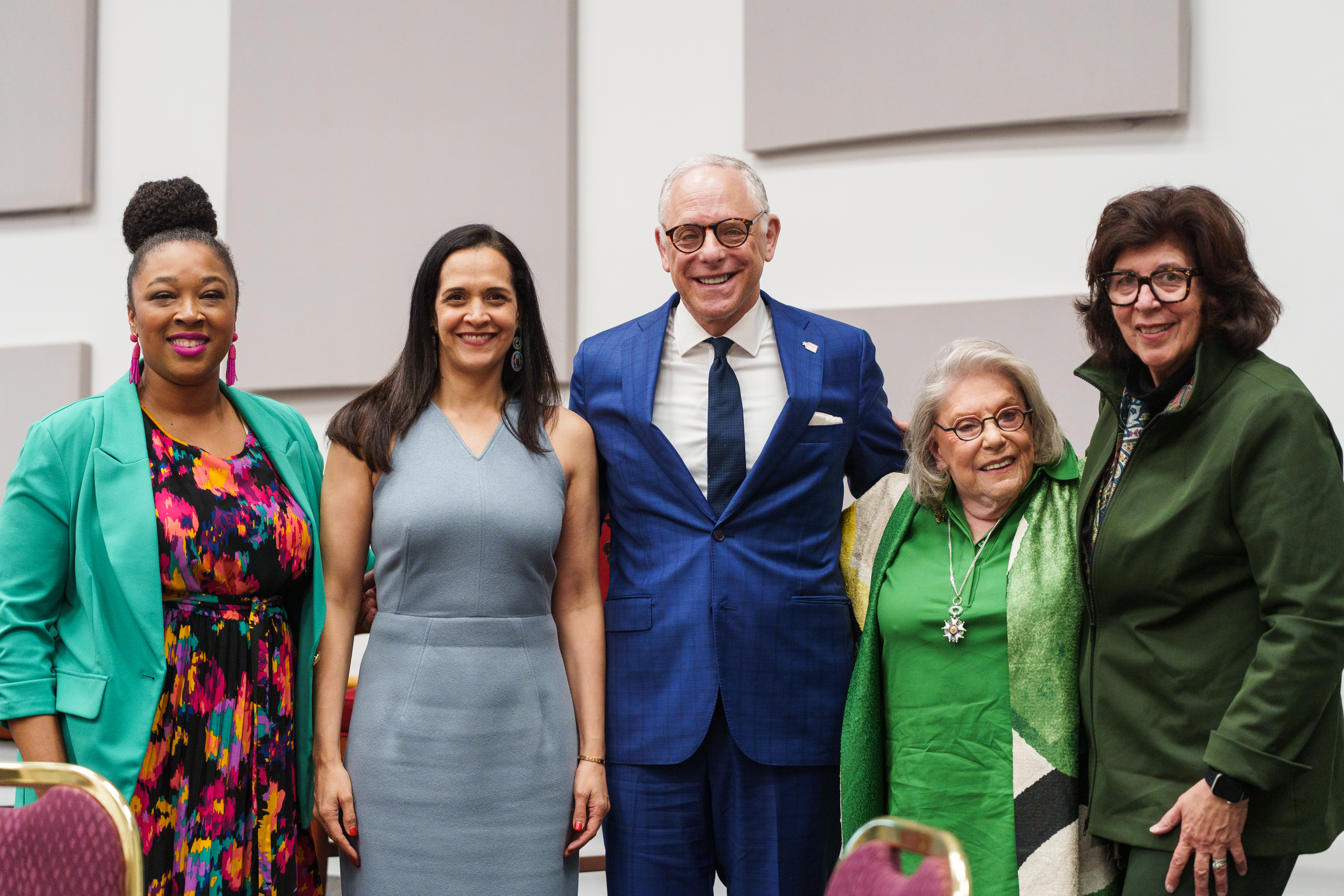The Sound of Music in the 21st Century: Holocaust Survivor Ruth Steinfeld Shares Her Story With HGO Audiences In Workshop
On April 24th, Houston Grand Opera hosted a public workshop—“The Sound of Music in the 21st Century”—in conjunction with the company’s production of the classic Rodgers and Hammerstein musical. The hourlong session was intended to provide a historical context for the show and emphasize its continuing relevance.
“We at HGO really believe in the power of theater and storytelling to promote connection and healing,” said General Director and CEO Khori Dastoor in her introduction. “Every step of the way, we have been mindful to hold education and remembrance at the center of our process.”
Moderated by Dr. Kiana Day Williams, HGO’s Associate Director of School and Educator Engagement, the discussion featured Shoah survivor Ruth Steinfeld, who serves on the Board of Advisors for the Houston Holocaust Museum. She was joined on the panel by Rabbi Edwin Goldberg of Congregation Beth Salom of the Woodlands, as well as Francesca Zambello, director of HGO’s Sound of Music production.
The 91-year-old Steinfeld—proudly wearing her Legion of Honor medal, France’s highest award—recounted the traumas of her early life. Born in southwest Germany, Steinfeld was five years old when the Nazis forced their way into her childhood home during the 1938 Night of Broken Glass.
“The only thing that they didn’t break on Kristallnacht was a lamp—a little candle—that was burning for my grandmother, who had just passed away.”
Her family was deported to France in 1940 and imprisoned at the Gurs internment camp. Steinfeld and her sister Lea were separated from their parents, who were later murdered at Auschwitz. The girls made their way by ship to the United States in 1946. Given the choice of moving to Seattle, Minneapolis, or Houston, Lea selected Texas for the sisters because “she wanted to see cowboys.”
In Houston, Steinfeld finished her schooling at night and began working for John F. Baugh, founder of Sysco Foods. Intent on putting her painful past behind her, she hid her Jewish identity from her employer. Once married, she avoided sharing her experiences with her husband and children. It wasn’t until a 1981 survivors’ reunion at Yad Vashem, the Holocaust memorial center in Jerusalem, that Steinfeld realized the necessity of testimony.

“Don’t ever hold anything because you think nobody wants to hear,” said Steinfeld, speaking directly to the highschoolers of HGO’s Opera Club and undergraduate students from the University of Houston in attendance. “Talk about it. There will be someone that will listen to you. Because once you’re able to talk, it doesn’t hurt quite as bad.”
In response to Steinfeld’s affecting message, Rabbi Edwin Goldberg addressed the persistence of antisemitism, which he called a “light sleeper” that “wakes up very quickly.” Goldberg, whose mother was a German-born survivor like Steinfeld, maintains that the greatest value he can impart to his young Jewish students is resilience—the kind of resilience he has always admired in the figure of Georg von Trapp from The Sound of Music.
“We can make fun of Captain von Trapp’s failure to parent in a very good way at the beginning of the show,” said Goldberg. “But his moral authority, I’m sure, shines through his descendants to this day. I can relate to the musical as the child of a refugee who had no choice except to try to survive. But I really admire those who had a choice, and they chose to fight the Nazis.”
Asked to expand on how she handled the musical’s historical context in her staging, Francesca Zambello explained that her approach begins in the present rather than the past. “Having people think about current events as performers I find helps them when they perform so they have something to draw on as actors.” She has cast members “internalize our current situation—to understand what it means when Russia invades Ukraine, the same way that Germany invaded Austria. What does it mean on October 7 when people are taken? As a director, you try to make people bring that intensity of what we feel when we watch the news.”
Zambello also pointed out that the Nazis of The Sound of Music are not as far removed as they might seem when fictionalized onstage. Fascism, as she noted, is still alive in the United States, and symbols like swastika armbands—which will be removed when actors are offset or taking bows—still hold significance.
“That’s very important to instill that respect in people so that they understand we cannot be portraying this in any way other than presenting it as pure evil—that it is not a theatrical convention, but that it is something real.”
In the Q&A portion of the workshop, the difficult question of forgiveness was raised. Rabbi Goldberg drew a distinction between Judaism’s attitude toward this subject versus Christianity’s doctrine of “turn the other cheek.”
“In Jewish tradition, forgiveness is given, but not so fast,” he said. “It’s not that we hold a grudge, necessarily. But it takes a certain vulnerability and the passage of time.” He added, “For me, forgiveness is nothing you do for the person who wronged you. Ultimately, if it’s real, it’s something you do for yourself. You let go of that pain.”
Steinfeld chimed in with a moving story of returning to her family home in Ladenburg long after the end of the war and meeting the woman who now lived there: “I started crying hysterically. And she was crying with me. And for the first time, I got it: we’re supposed to understand that we’re all God’s children. Well, I never was anybody’s child that I could prove. I couldn’t prove that I was the daughter of Anna and Alfred—I could never do that. But finally, I looked at her, and she was crying. And for the first time I knew that we were all God’s children.”